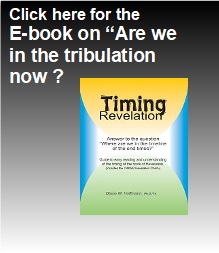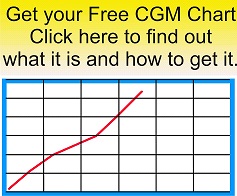Easter/Passover, Show 319 Replay
Transcript from show #319 Replay
(Please note that the transcripts are written pretty well as they were delivered on air).
Radio Show...
This program continues on various series of different topics on theology such as end times, prophecies, daily living, etc. as the subject matter comes up.
The e-book on end times and Revelation, answering the questions “where are we in the events of the end times?” and “Are we now in the tribulation?” is available on this web site, which you can find throughout the pages.

Opening Narrative
Well today is a special day, as we celebrate the wonderful Feast of Passover – or as we call it in the Christian faith -- Easter.
And it is not without some controversy within the Church of the believers as to the name of the Christian celebration… but I won’t get into that in this program because there is enough being talked about on a regular basis every time we come to this time of the year… plus I have also covered that in a previous radio program, as well as written articles on the subject…
Except that I will say whether we call it Passover or Easter, we are celebrating the same event – that is: the Jewish people remember their Exodus from Egypt… and the Christians remember the great day of redemption completed by the death and resurrection of Christ, the Messiah who came to this earth in the year of 3758 according to Jewish calendar calculation.
The Good news is that Jesus the Messiah fulfilled the Old Testament meaning of the Passover.
We’ll talk more about that in a moment…
But first, let’s open the service with this wonderful piece of music…
(Let us pray...
The Lord's Prayer...
Praise God Doxology...
Worship Music...)
Narrative #1
So, getting back to the message for today about the celebration of Passover and Easter, I will not be getting into the controversy of the “Easter” aspect, except to say that the reference to pagan celebrations, and the bunnies and chocolate etc… is definitely the secular version of Easter and the name reference about the pagan star, etc… we will all have heard plenty about that at this time of the year…
What I will focus on is some of the interesting things that we don’t often hear in church or on many of the television programs that we hear also at this time of year.
For instance, in doing a search in the Bible (in the King James version), it is interesting to find that the word “Passover” is referred to 72 times… 46 times in the Old Testament and 26 times in the new…
Most interesting about this is that although the word Passover is 1st mentioned in the book of Exodus, it is most mentioned in the book of 2nd Chronicles for a count of 17 times…
and interestingly again, this book happens to be about the re-building of the Temple after the return of the Jewish people following the Babylonian captivity some 480 years later.
Exodus
In the book of Exodus which is where we first read about the Passover, it is mentioned only 6 times…. Beginning in chapter 12…
Now most believers know, this book of Exodus is the fabulous book of the deliverance of the Israelite people from the 400 years of slavery in Egypt, through or by God’s man Moses. And that took place around 1450 BC.
Numbers
Then the next book in which the word Passover is most mentioned is the book of Numbers, for a count of 10 times… and that took place also during the same timeline of around 1450 BC.
Now the book of Numbers is about the numbering of the people as they prepared for the journey to the promised land and a recall of the fruitless wanderings of a people who trusted God for deliverance from the captivity but who failed to trust Him to lead after deliverance.
And this typifies those today who trusted Christ to save them from sin but then refused to yield themselves completely for the daily walk in this wilderness of sin which is the present world at large with its temptations.
The Word of God tells us, “…be ye doers of the word, and not hearers only, deceiving your own selves. (James 1:22)
John
The next book with the most number of mentions of the word Passover is found in the New Testament, in the book of John, with 9 times – 3 more than in the book of Exodus… and then Luke follows at 7 times… 1 time more than in Exodus…
Deuteronomy, Matthew and Mark
Then in Deuteronomy, Matthew and Mark the word Passover is mentioned 4 x each.
Then, 2nd Kings – 3 x; Joshua and Ezra 2x; and finally Leviticus, Ezekiel,
1st Corinthians and Hebrews, it is mentioned 1x each.
So we have some scriptures from the Old Testament which speak of the Passover that was held during that time before Christ…
And we have some scriptures from the new Testament that refer to the Passover held during the time before the death and resurrection of Christ and then after the death and resurrection of Christ who then became our Passover (1st Corinthians 5:07…
We will take a look at that in a moment…
(Music Interlude and Station ID)
Narrative 2
So let’s take a look at some of the scriptures from the new Testament that refer to the Passover held during the time before the death and resurrection of Christ and then after the death and resurrection of Christ who then became our Passover…
But before I get into those scriptures, here’s a little bit of very interesting history:
As I mentioned earlier, the word Passover appears in the Bible (King James) 72 times -- 46 times in the Old Testament and 26 times in the New…
But here’s the interesting part and don’t miss this if you have any kind of concern about the controversial conversations going on about the celebration of the Passover vs Easter ….
I was also curious to see if the word “Easter” appeared at all in the Bible. So I checked. And to my surprise, yes it does appear – howbeit only 1 time, and that is in the book of Acts, chapter 12… v.4
In checking the Greek word we find that this word “Easter” used here in the King James Bible is the same word used for all the words “Passover” in the new testament” … and that is the word “pa-scha” (3957)…
(Interestingly, the Geneva Bible which was produced by the year 1599, and which was the favorite of the Puritan Christians at the time… also used the word “Easter”…
and the Geneva was greatly used to produce the King James… and so were many others such as Coverdale, and Tyndale which goes back to the early 1500’s, also used the word Easter but spelled “ester” rather than easter...
but, and this is important to note: the Greek word in all cases, is the word “pa-scha” which is the same word Passover used in all the other scriptures …
Now, the English description of the Greek word “pa-scha” is this:
1.the paschal sacrifice (which was accustomed to be offered for the people's deliverance of old from Egypt)
2.the paschal lamb, i.e. the lamb the Israelites were accustomed to slay and eat on the fourteenth day of the month of Nisan (the first month of their year) in memory of the day on which their fathers, preparing to depart from Egypt, were bidden by God to slay and eat a lamb, and to sprinkle their door posts with its blood, that the destroying angel, seeing the blood, might pass over their dwellings; Christ crucified is likened to the slain paschal lamb
3.the paschal supper
4.the paschal feast, the feast of the Passover, extending from the 14th to the 20th day of the month Nisan
As a matter of interest, the word Passover in the Old Testament is, of course, in the Hebrew language but is very close sounding to the Greek…
The word in the Hebrew used in the Old Testament is “pecach” (peh'·sakh), and the english description for this word is:
1.sacrifice of passover
2.animal victim of the passover
3.festival of the passover
So that was a piece of history that is very important to add to all the details of this wonderful time of the year…
So let’s get back to the new testament scriptures that refer to the Passover:
There are 4 mentions of the word Passover in the book of Mark… here they are:
Mark 14:1
After two days was the feast of the passover, and of unleavened bread: and the chief priests and the scribes sought how they might take him by craft, and put him to death.
So the religious leaders did not like what Jesus was preaching and they sought to take Him by craft (or by tricking Him). Now it is significant to note that this is taking place toward the end of His ministry, around the year 30 A.D.
Mark 14:12
And the first day of unleavened bread, when they killed (had sacrificed) the passover, his disciples said unto him, Where do you want us to go and prepare that you might eat the passover? (referring to the last supper that we are all familiar with).
Now this is important in that this Passover was the last one that took place before Jesus’ death and resurrection which ended the Passover of the Old Testament.
The next two scriptures here are Mark 14:14 and 14:16, but to get the continuity of the story here we need to read from Mark 13… so,
13 And He sent out two of His disciples and said to them, “Go into the city, and a man will meet you carrying a pitcher of water; follow him.
14 Wherever he goes in, say to the master of the house, ‘The Teacher says (asks), “Where is the guest room in which I may eat the Passover with My disciples?” ’
15 Then he will show you a large upper room, furnished and prepared; there make ready for us.”
And the next verse, 16, is where the word Passover is mentioned:
16 And his disciples went forth, and came into the city, and found as he had said unto them: and they made ready the passover.
Just before I get into the next verses that contain the word Passover, I just want to read that scripture I referred to earlier which uses the word “Easter” in the book of Act, chapter 12 and verse 4…. It says this:
4 And when he had apprehended him, he put him in prison (this is speaking of Peter who was taken by the Herod of that time in 44 A.D ), and delivered him to four quaternions of soldiers (that’s 16 soldiers) to keep him, intending after Easter (here’s that word used here – for Passover) intending after Easter to bring him forth to the people.
Then we have 7 scriptures in the book of Luke… with 7 mentions of the Passover…
Luke 2:41
Now his parents went to Jerusalem every year at the feast of the passover.
And of course this is referring to the beginning of the book of Luke speaking of the time during Jesus’ childhood…
Then it jumps to chapter 22 of the book of Luke in the later time of Jesus’ ministry, closer to his final days before his death and resurrection.
Luke 22:1
Now the feast of unleavened bread drew nigh (near), which is called the Passover.
Luke 22:7
Then came the day of unleavened bread, when the passover must be killed.
Luke 22:8
And he sent Peter and John, saying, Go and prepare us the passover, that we may eat.
And then we have the story again that we read in the book of Mark:
Luke 22:11
And ye shall say unto the goodman of the house, The Master saith unto thee, Where is the guestchamber, where I shall eat the passover with my disciples?
Luke 22:13
And they went, and found as he had said unto them: and they made ready the passover.
And then we get a few more details in the next scripture of verse 15 which take place right during the last supper:
Luke 22:15
And he said unto them, With desire I have desired to eat this passover with you before I suffer:
And again in order to get the continuity of this detail and the details of the last supper that we as believers have been celebrating every since, we need to read from verse 14 to 20:
14 And when the hour was come, he sat down, and the twelve apostles with him.
15 And he said unto them, With desire I have desired to eat this passover with you before I suffer:
16 For I say unto you, I will not any more eat thereof, until it be fulfilled in the kingdom of God.
17 And he took the cup, and gave thanks, and said, Take this, and divide it among yourselves:
18 For I say unto you, I will not drink of the fruit of the vine, until the kingdom of God shall come.
19 And he took bread, and gave thanks, and brake it, and gave unto them, saying, This is my body which is given for you: this do in remembrance of me.
20 Likewise also the cup after supper, saying, This cup is the new testament in my blood, which is shed for you.
(Music Interlude)
Narrative #3
So let’s continue with the next verses that speak of the Passover… taking us into the book of John where Passover is referred to 9 x
John 2:13
And the Jews’ passover was at hand, and Jesus went up to Jerusalem,
John 2:23
Now when he was in Jerusalem at the passover, in the feast day, many believed in his name, when they saw the miracles which he did.
John 6:4
And the passover, a feast of the Jews, was nigh (near).
These scriptures are early in Jesus’ ministry, so these would be referring to his first or 2nd Passover in 28 or 29 A.D.
John 11:55
And the Jews’ passover was nigh (near) at hand: and many went out of the country up to Jerusalem before the passover, to purify themselves.
Here we are more advanced in time toward the last year of Jesus’ ministry… close to His 3rd and last Passover in the year A.D. 30…
John 12:1
Then Jesus six days before the passover came to Bethany, where Lazarus was which had been dead, whom he raised from the dead.
And of course you remember that miracle Jesus did raising Lazarus from the dead…
John 13:1
Now before the feast of the passover, when Jesus knew that his hour was come that he should depart out of this world unto the Father, having loved his own which were in the world, he loved them unto the end.
(Now speaking of his disciples and those who followed him… in these passages of scripture we find the famous prayer of John 17, where Jesus prayed to the Father for his disciples and those in the world who would follow him…)
John 18:28
Then led they Jesus from Caiaphas (the high priest) unto the hall of judgment: and it was early; and they themselves went not into the judgment hall, lest they should be defiled; but that they might eat the passover.
John 18:39
(that’s when Jesus is taken before Pilate and Pilate says to the crowd that he finds no fault in Jesus at all and then puts the question to them as to who they want to release to freedom:
“But ye have a custom, that I should release unto you one at the passover: will ye therefore that I release unto you the King of the Jews?
And the last scripture in this book of John that mentions Passover is John 19:14 after Pilate had tried to release Jesus, but the crowd refused and cried out “crucify Him”…
John 19:14
And it was the preparation of the passover, and about the sixth hour (this would be at noon time): and he saith unto the Jews, Behold your King!
That was the most crucial and dreadful moment of Jesus’ ministry… moments after the painful prayer of Gethsemane where he alone agonized in the garden over the fatal hour that was now upon Him…
And then the last two verses in the new Testament which have 1 mention each of the Passover…
These 2 scriptures are different from the rest of them that we just read… in that they are after the death and resurrection…
Here we have a whole new revelation of the meaning of Passover…
1 Corinthians 5:7
Purge out therefore the old leaven, that ye may be a new lump, as ye are unleavened for Christ our passover is sacrificed for us:
Here, in this letter written some 25 years later, Paul uses the illustration of the Passover to remind the believers of the Christ who was sacrificed as the fulfillment of the old testament Passover Feast of Unleavened Bread, that used to be kept every year as the schooling of the need for the sacrificial Lamb to cover their sin – temporarily – but which now had been fulfilled once and for all in the sacrificial Lamb of God that was Jesus Christ, “which took away the sin of the world” (John 1:29) .
And then the final scriptures in the new testament that mentions the Passover is a reference to how it used to be in the Old testament, particularly here in the historical setting of Moses in the Exodus of the Israelites from Egypt…
In the teaching of “faith” having now replaced the ordinances of the Old Testament….
Hebrews 11:28
Through faith he (Moses) kept the passover, and the sprinkling of blood, lest he that destroyed the firstborn should touch them.
But the contrast is that of the failure of the old covenant as explained in the previous chapter…
10 For the law having a shadow of good things to come, and not the very image of the things, can never with those sacrifices which they offered year by year continually make the comers thereunto perfect.
2 For then would they not have ceased to be offered? because that the worshippers once purged should have had no more conscience of sins.
3 But in those sacrifices there is a remembrance again made of sins every year.
4 For it is not possible that the blood of bulls and of goats should take away sins.
And then speaking of the Christ – the Lamb of God to come, we read in verse 9 of the book of Hebrews 11:
9 Then said he, Lo, I come to do thy will, O God. He taketh away the first, that he may establish the second.
Takes away the first (the old testament, that he may establish the second- the new testament)…
Then verse 10:
10 By the which will we are sanctified through the offering of the body of Jesus Christ once for all.
And there is so much more in this book of Hebrews which is extremely important for the understanding of who Christ is as superior to the prophets, the angels, Moses, Melchisedek, Aaron, and so on… he is superior to all…
He is the appointed heir of all things by whom also he made the worlds… the brightness of God’s glory, the express image of His person… upholding all things by the word of his power…
And again, as I said there is much more to learn and carefully digest in this magnificent unique book written particularly for first-century Hebrew believers and all other gentile believers then, and all generations to come….
Where Christ is presented our High priest in all his glory and magnificence of the fulfillment of Old Testament teachings and prophecies.
(Music Interlude)
Closing Narrative…
Before I dismiss the service today, I want to read to you the Blessing that was read to the people of God in Numbers 6:24-26 which is the benediction from God to you today:
“The Lord bless thee, and keep thee: The Lord make his face shine upon thee, and be gracious unto thee: The Lord lift up his countenance upon thee, and give thee peace."
I hope and pray that you will come back next Sunday at SpiritFM.ca, 7 am and 7 pm pacific time. And if you want to hear the service again at any time, you can go to my website at TimingRevelation.com, and click on the Radio Shows navigational tab along the left side. The replays are available there for five weeks, then they are transcribed into articles as new radio shows are put up.
I encourage you to go to your Bible and read further on the scriptures that were given throughout the program today. And if you like these programs and you've been blessed, call or write the station and let them know... if you said the prayer and have accepted the Lord or you've been healed or touched in some way by the Holy Spirit, write to me on the contact form of this web site...
...and this web site is also where you will find the Free Offer of the “Christian Growth and Maturity Chart” that I talked to you about in the last weeks... you will see the graphic on any page called “Get your free CGM Chart”, click on it and it will take you to a page that will tell you about it and how you can subscribe to my newsletter to get your free copy of the Chart sent to you.
Until next week, Maranatha, the Lord is coming, very soon. Goodbye and Blessing.
/DMH
Click here to hear the song "He's Alive" by Don Francisco.
/DMH
click on the graphic just above to share your thoughts...
or
click on this graphic to go to Christianbook affiliate store products:

P.S.: For your information I am a participant of the Christianbook affiliate program and as such will receive a small commission on purchases made by my readers. I want to thank you for buying your Christian products through here... all of this helps me with the expenses of providing this important ministry and operating this web site.
Blessings,



